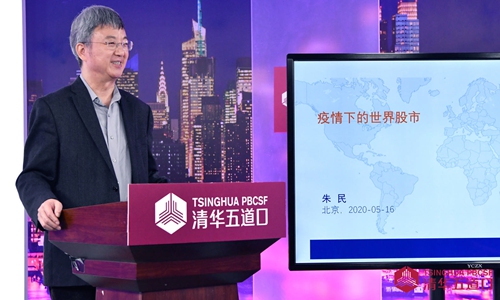China's timely policy response has proved effective in propping up coronavirus-hit economy: top financial influencers
By Li Qiaoyi Source: Published: 2020/5/16 14:11:50

Zhu Min speaks at the 2020 Tsinghua PBCSF Global Finance Forum on Saturday. Photo: Courtesy of Tsinghua PBCSF
China's timely macroeconomic policy response to the coronavirus outbreak has proved effective in propping up its economy that's on track for positive growth in 2020, top Chinese financial influencers said Saturday at a high-profile online forum.
China has rolled out a great deal of macro and financial policy to cope with the virus, involving a lot of innovation, which has proven effective at large, Zhou Xiaochuan, former governor of the People's Bank of China (PBC), the country's central bank, said in a keynote speech at the 2020 Tsinghua PBCSF Global Finance Forum.
The nation has manifested a timely and powerful monetary policy response that helped overcome the epidemic and spur demand, as well as, brought relief to battered businesses and individuals, Zhou said, commenting that it's effective overall.
Speaking at the forum, former IMF Deputy Managing Director Zhu Min said work and production resumption had progressed well in China, paving the way for the economy to rebound in the third quarter and record a 3 percent expansion of the whole year.
The economy posted a contraction of 6.8 percent in the first quarter, hit by the disease, but is showing signs of leading the global economy out of the virus-inflicted gloom.
China's gigantic market potential is the nation's unique strength underpinning its anti-COVID-19 efforts, Xiao Gang, former chairman of the China Securities Regulatory Commission (CSRC) said at the forum, citing the nation's 800 million-plus labor force that exceeds the combined number of developed nations.
Xiao, who headed the nation's stock markets during the 2015 rout, numerated multiple sets of data to substantiate the Chinese economy's fundamental strength, not only in the coronavirus-shadowed short term but over the longer term.
China's marketplaces for stocks, bonds, and private equity are all ranked No.2 globally; the national savings rate stands at 47 percent; its foreign reserves top $3 trillion, accounting for 28 percent of the global total; the nation's manufacturing added value hit $4 trillion, equivalent to the combined readings for the US, Germany, and Japan.
The former CSRC head said China's urbanization rate, which hit 59.2 percent in 2018, well below an average 80 percent in developed nations, is projected to rise to 70 percent in the next 10 to 15 years, an indication of the nation's huge potential in terms of a new source of growth, according to Xiao. It's estimated that each 1 percentage point increase in urbanization rate per annum means 14 million people going to cities, an addition of an entire Shenzhen annually, he said.
Noteworthily, Zhu, also former deputy governor of PBC and now chair of the National Institute of Financial Research at Tsinghua University, made mention of wild swings in US stocks at the forum, addressing concerns over liquidity-fueled gains.
US stock markets had experienced its worst fall in decades, in terms of percentage drop and speed of the decline, which was followed by its most impressive rebound since late March. The rebound is driven by unprecedented financial and fiscal stimulus, Zhu said.
Recovery of US real economy is still not in sight, as the pandemic is yet to be contained in the US, where cases are still growing exponentially, and the virus data is apparently underestimated, he noted.
Warnings were also voiced at the forum of potential policy spillovers that could put the financial system at risk.
There are concerns over potential side effects of monetary policy easing, which might put some of the money, supposed to fund the real economy, into the capital market, said Zhou, currently the honorary dean of Tsinghua PBCSF.
Zhou recalled efforts by China's financial authorities to hedge against risks during the 2003 SARS epidemic, including curbs imposed on property market lending, reserve requirement raise, and lending freeze.
The nation ought to "save bullets" in the use of monetary policy which needs to run in tandem with fiscal policy for there to be more effective policy transmission, Zhou suggested.
Posted in: ECONOMY,BIZ FOCUS